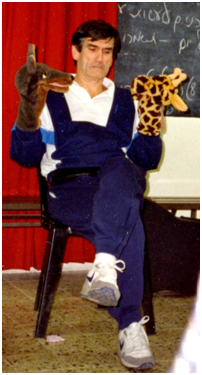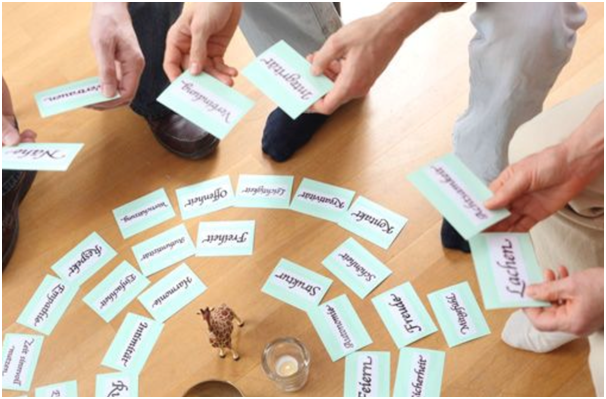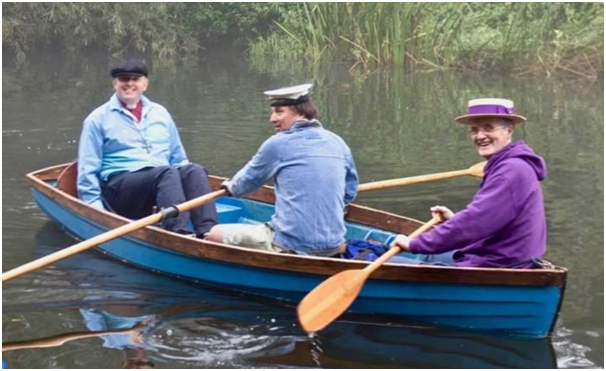 In the last blogs we discussed how the human tendency to experience ourselves as connected to one another can be disrupted by traumatic memories and how this disruption leads to a distorted view that legitimizes violence based on fear. We also observed how this view has become established within European history and has enabled oppression, terror and wars. In order to create the conditions for peaceful coexistence in the future, it is therefore not only necessary to promote the processing of traumatic experiences, but also to recognize and revise the destructive effects of this distorted view.
In the last blogs we discussed how the human tendency to experience ourselves as connected to one another can be disrupted by traumatic memories and how this disruption leads to a distorted view that legitimizes violence based on fear. We also observed how this view has become established within European history and has enabled oppression, terror and wars. In order to create the conditions for peaceful coexistence in the future, it is therefore not only necessary to promote the processing of traumatic experiences, but also to recognize and revise the destructive effects of this distorted view.
The fact that a fundamental change of perspective is urgently needed is also made clear by the statements of literary scholars Peter Haidu and Vincent Pecora. Haidu calls for an ethics in which the ‘other’ is encountered and recognised in its presence in a way that calls for unlimited responsibility that could be “the ironclad guarantee for non-recurrence” of the Holocaust (Haidu 1992: 282).
Pecora (1992) demands that the Holocaust needs to be understood in its historical context to provoke a change in perspective that prevents further violence.
“If the specific and terrifying suffering endured by the victims of Nazi persecution is not mobilized to remind the West of the barbarity folded into even its most admirable traditions, but instead serves to obscure it, and perhaps to foster surreptitiously a smug sense of political complacency and assuredness, than that suffering will end up serving barbaric purposes all over again” (Pecora 1992: 163).
 Since the fear-based perspective that classifies some people as ‘others’ and legitimizes violence against these ‘others’ forms the basis of our Western society and influences our thinking on many levels, a fundamental rethinking is required. Language as an expression of our way of thinking can play an important role in this process and a revision of our communication behavior can be the key to change. The American psychologist Marshall B. Rosenberg developed an alternative communication model with regard to speaking and listening that can enable such a change. Rosenberg identified a loss of reference in communications in which speakers trigger feelings such as fear, guilt and shame in their listeners through moral judgments and static generalizations. He called this type of communication “alienating from life” and proposed a model that promotes a connection to oneself and others. He called this model “Non-Violent Communication” (NVC). Rosenberg believed that giving and receiving compassionately is an essential part of human nature and that a loss of connection with ourselves and others is caused by what he called ‘destructive cultural learning’. Rosenberg’s model of nonviolent communication reverses this destructive learning by teaching us to observe without judgement or evaluation. By promoting a nonjudgmental experience, empathy towards oneself and others becomes possible. Feelings and needs can be clearly identified and communicated, creating situations in which everyone’s needs can be acknowledged, respected and considered (Rosenberg, 2003).
Since the fear-based perspective that classifies some people as ‘others’ and legitimizes violence against these ‘others’ forms the basis of our Western society and influences our thinking on many levels, a fundamental rethinking is required. Language as an expression of our way of thinking can play an important role in this process and a revision of our communication behavior can be the key to change. The American psychologist Marshall B. Rosenberg developed an alternative communication model with regard to speaking and listening that can enable such a change. Rosenberg identified a loss of reference in communications in which speakers trigger feelings such as fear, guilt and shame in their listeners through moral judgments and static generalizations. He called this type of communication “alienating from life” and proposed a model that promotes a connection to oneself and others. He called this model “Non-Violent Communication” (NVC). Rosenberg believed that giving and receiving compassionately is an essential part of human nature and that a loss of connection with ourselves and others is caused by what he called ‘destructive cultural learning’. Rosenberg’s model of nonviolent communication reverses this destructive learning by teaching us to observe without judgement or evaluation. By promoting a nonjudgmental experience, empathy towards oneself and others becomes possible. Feelings and needs can be clearly identified and communicated, creating situations in which everyone’s needs can be acknowledged, respected and considered (Rosenberg, 2003).
“NVC guides us in reframing how we express ourselves and hear others. Instead of habitual, automatic reactions, our words become conscious responses based firmly on awareness of what we are perceiving, feeling and wanting. We are led to express ourselves with honesty and clarity, while simultaneously paying others a respectful and empathetic attention” (Rosenberg 2003)
Rosenberg believed that life-alienating communication reflects and reinforces hierarchical social structures and that communication that restores connection to oneself and others can also contribute to social change:
“Life-alienating communication both stems from and supports hierarchical and domination societies, where large populations are controlled by small numbers of individuals to those individuals own benefit… the language of wrongness, should and have to, is perfectly suited to this purpose: the more people are trained to think in terms of moralistic judgements that imply wrongness and badness, the more they are trained to look outside themselves – to outside authorities – for the definition of what constitutes right, wrong, good and bad. When we are in contact with our feelings and needs, we humans no longer make good slaves and underlings” (Rosenberg, 2003)
What Rosenberg calls ‘destructive cultural learning’ is learning that is based on a perspective that judges, such as between people who were born to rule and those who were born to be ruled. The separation through judgement blocks the feeling of social connectedness and legitimizes violence. In order to break free from this violence, which begins in thought and speech, one must recognize this connection and strive to learn a new way of thinking and speaking in which people are never judged or condemned. We have seen that, due to synaptic plasticity, we are constantly changing and can therefore be present in the ‘here and now’ in the flow of an ever-changing environment. Any judgement, whether positive or negative, would impair this state of ‘being able to constantly change’ and can therefore be understood as ‘non-life-affirming’ and ‘promoting violence’. The philosopher Rosi Braidotti speaks of being ‘in becoming’ rather than ‘to be’ (Braidotti, 2006) to make this important distinction clear. Violence therefore begins where we judge ourselves or others and ends in a hierarchical social structure characterized by oppression and violence.
“Destructive cultural learning… is so ingrained in our lives that we are no longer conscious of it. In the same way, pain engendered by damaging cultural conditioning is such an integral part of our lives that we can no longer distinguish its presence. It takes tremendous energy and awareness to recognize this destructive learning and to transform it into thoughts and behaviors that are of value and of service to life”
(Rosenberg, 2003)
 NVC is a very concrete and multi-layered learning system that can enable the necessary change of perspective that provides the basis for a truly peaceful coexistence.
NVC is a very concrete and multi-layered learning system that can enable the necessary change of perspective that provides the basis for a truly peaceful coexistence.
There will always be experiences that are perceived as life-threatening and leave behind traumatic memories, as well as experiences that negatively affect social and societal relationships. The important thing is that a loss of relationship, regardless of the level at which it occurred, is recognized, acknowledged and processed in such a way that the lost emotional connections can be rebuilt. At the same time, we must strive for a fear-free perspective in which the other is recognized and valued as a mirror of one’s own self and the state of being connected to one another is seen as the only possible basis for a sustainable way of life.
The philosopher Rosi Braidotti talks about an ethics of “sustainable affirmative relations” which facilitates the recognition and renegotiation of our being “in this together,” leading towards “the construction of communities where the notion of transience, of passing is acknowledged in a sober secular manner that binds us to the multiple ‘others’ in a vital web of interrelations”.
(Braidotti, 2006)
 Addressing traumatic events such as the Holocaust in a way that acknowledges the loss of the connections that the event made possible and thereby enhances our understanding of ourselves can be an important step in returning us to our capacity for empathy and compassionate interaction. Trauma and traumatic experiences can thus become valuable opportunities for growth and learning.
Addressing traumatic events such as the Holocaust in a way that acknowledges the loss of the connections that the event made possible and thereby enhances our understanding of ourselves can be an important step in returning us to our capacity for empathy and compassionate interaction. Trauma and traumatic experiences can thus become valuable opportunities for growth and learning.
Bibliography
Braidotti, R. (2006). Transpositions: On Nomadic Ethics. Cambridge: Polity Press.
Haidu, P. (1992). The dialectics of Unspeakability: Language, Silence, and the Narratives of Desubjectification. In S. Friedlander (Ed.), Probing the limits of cultural representation (p. 277). Cambridge: Havard UP.
Pecora, V. P. (1992). ‘Habermas, Enlightenment and Antisemitism’. In Probing the limits of cultural representation (p. 161). Cambridge: Havard UP.
Rosenberg, M. B. (2003). Nonviolent Communication: A Language of Life. Encinitas: Puddledancer Press.
Images
https://photographycourse.net/perspective-photography/
https://en.wikipedia.org/wiki/Nonviolent_Communication#/media/File:MarshallRosenberg1990.jpg
https://www.stratford-herald.com/news/three-men-of-the-cloth-in-a-boat-9133030/